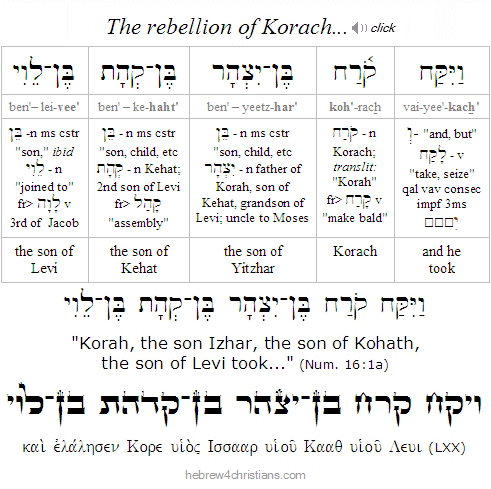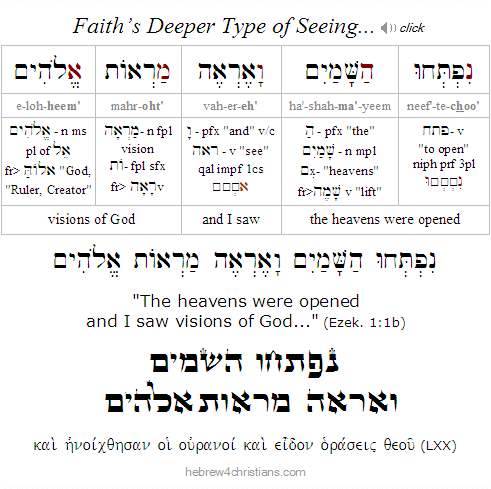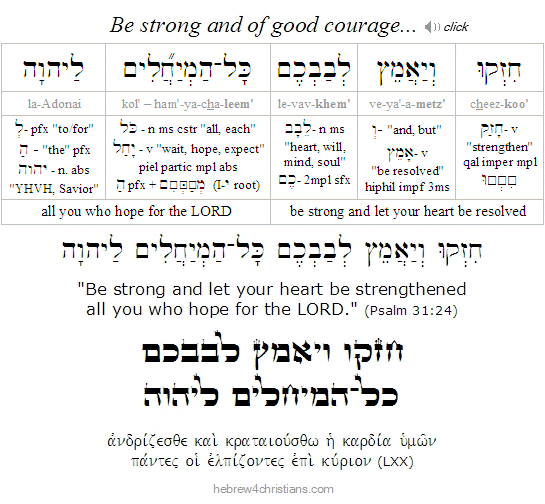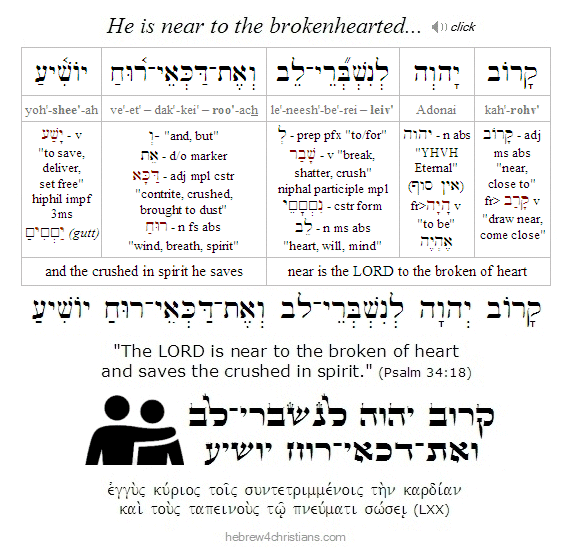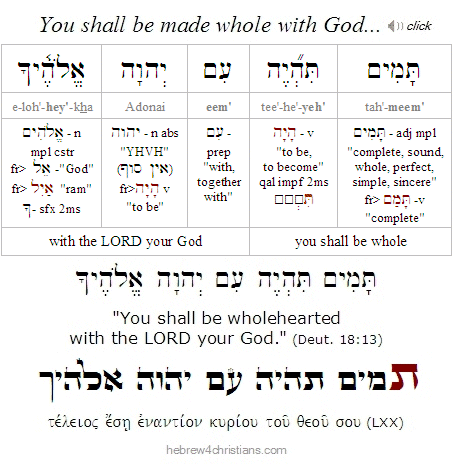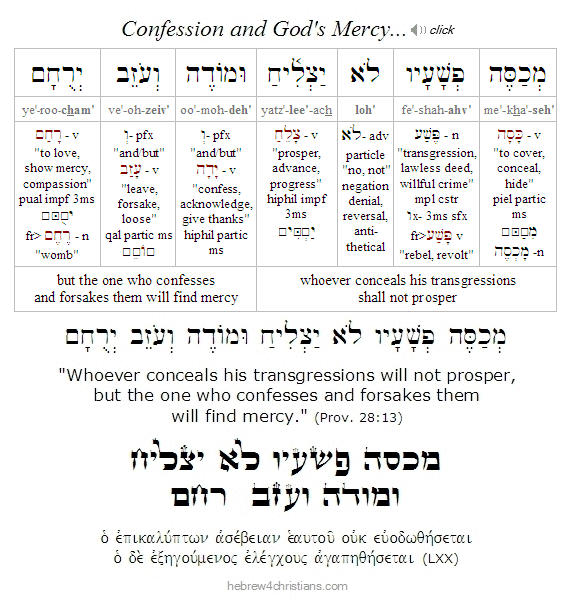|
June 2021 Updates (continued)
Note: If any page content appears to be missing, please refresh the page...
The Rebellion of Korah (פרשת קורח)

06.06.21 (Sivan 26, 5781) Last week's Torah portion (Shelach Lekha) told the tragic story about the "sin of the spies" (חטא המרגלים) and the divine decree that the generation rescued from Egypt was sentenced to die in the exile of the desert. In this week's portion (parashat Korach), the hard truth of their condition began to sink in, and the people bemoaned their fate and rebelled further by attempting to overthrow God's designated leadership and return to Egypt. This rebellion was instigated and organized by Moses' cousin Korach, who along with a band of co-conspirators was swiftly judged and put to death, thereby vindicating the Aaronic priesthood and Moses' leadership of Israel.
Korach was the cousin of Moses and a well-respected Kohathite who was honored to be one of the carriers of the Holy Ark (ארון הברית). He was a wealthy man of influence - a nassi (prince) of the people. Despite all this privilege, however, Korach rationalized that he should be the head of the Kohathite clan (instead of his cousin Elzaphan), since he was the firstborn of Kohath's second son, whereas Elzaphan was not even a firstborn son. Indeed, because he felt slighted by Moses' choice, Korach went even further and brazenly questioned whether the office of the High Priest should not have been given to him rather than to Aaron.
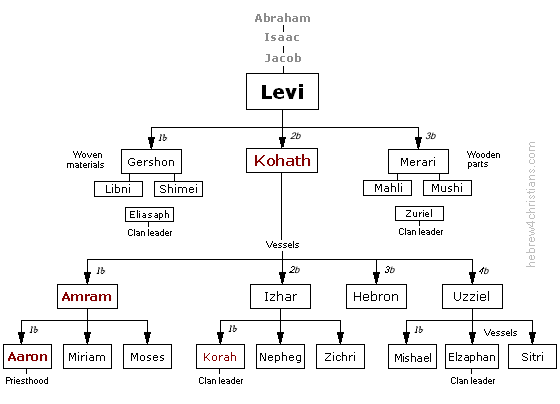 |
Korach's co-conspirators were two brothers named Dathan and Abiram from the tribe of Reuben, Israel's firstborn son. Together, they put together a force of 250 men to confront Moses and to challenge his exclusive claim to leadership: "You have gone too far! For all in the congregation are holy, every one of them, and the LORD is among them. Why then do you exalt yourselves above the assembly of the LORD?" (Num. 16:3).
In response to their challenge, Moses proposed that Korach and his followers bring firepans to offer incense at the Tabernacle to determine whether they were indeed chosen to serve as priests. The following morning, when Korach and his 250 followers assembled at the gate of the Tabernacle to offer incense, God threatened to destroy them all instantly. Moses begged God not to destroy all the people, but only the rebels. He then warned the congregation to stand clear of the dwellings of Korach, Dathan, and Abiram. The earth then opened up and swallowed them alive, and a fire consumed the 250 men who illegitimately offered the incense...
Korach's rebellion introduced outright mutiny and chaos within the leadership of the camp that brought swift and terrible rebuke from the LORD. Nevertheless, the very next day the entire congregation of Israel audaciously began to accuse Moses and Aaron, saying: "You have killed the people of the Lord." When the people looked toward the Tabernacle, however, the Glory of the LORD appeared, where God descended to tell Moses and Aaron that he was going to destroy the Israelites for their treason. Despite Moses and Aaron's fervent intercession, however, a deadly plague broke out among the people. Moses then instructed Aaron to take his firepan with incense and to bring it in the midst of the congregation to make atonement for them. Aaron did so, "and he stood between the dead and the living; and the plague was stayed." The Torah tells us that 14,700 Israelites died because of the plague, not including the deaths of those involved in the rebellion of Korach.
As a final test to vindicate Aaron as God's chosen priest, each of the twelve tribal heads of Israel, as well as Aaron himself, were instructed to bring their staffs to Moses. Moses then inscribed their names on each staff and brought them into the sanctuary before the ark of the testimony. "And the staff of the man whom I choose shall sprout. Thus I will make to cease from me the grumblings of the people of Israel, which they grumble against you." The following day Moses went into the Tabernacle and "behold, the staff of Aaron for the house of Levi had sprouted and put forth buds and produced blossoms, and it bore ripe almonds." He then brought out all the staffs and gave them back to each of the tribal leaders. God then told Moses to return Aaron's staff to the Tabernacle as a testimony for generations to come.
Faith's Deeper Seeing...

06.04.21 (Sivan 24, 5781) Our Torah portion for this week (i.e., Shelach) begins: "The LORD spoke to Moses, saying, 'Send for yourself (שְׁלַח־לְךָ) men to spy out the land...'" (Num. 13:1-2). Finally, after all that the LORD had done for his people -- redeeming them from slavery, providing them miracles of manna and living water, and making covenant with them to be his set apart people -- the Israelites were given the opportunity to enter the promised land! The vision of Zion was about to be fulfilled! And yet the people faltered; the reports of the spies discouraged and blinded them... In this connection, the sages taught that the Book of Ezekiel begins: "The heavens were opened and I saw visions of God," the first letters of which may be arranged to spell the Hebrew word for "faith" (אמונהֹ). Faith is a deeper type of seeing by which we are enabled to apprehend truth about reality...
Hebrew Lesson:
Every Person's Journey...
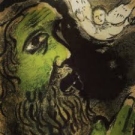
06.04.21 (Sivan 24, 5781) "No tree, it is said, can grow to heaven unless its roots reach down to hell" (C.J. Jung). The Book of Job tells the story of every person... We are all immersed into this world in ways beyond our control; we are all tested by troubles and afflictions of various kinds; we all argue with God in our ignorance and in the depths of our ignorance. We protest; we object; we bargain; and we lament until we are left in unknowing silence. We do not know why we suffer or the meaning of our suffering, but if, through our struggle, God lets us know that he is truly present, we are blessed and the miracle of acceptance occurs: we receive a "new name" and affirm from the heart "blessed are the poor in spirit..." "blessed are they that mourn..." "blessed are they that hunger and thirst..." Such godly sorrow produces "repentance that leads to salvation without regret, whereas worldly sorrow produces death" (2 Cor. 7:10). God cannot speak to the proud of heart, since they feel no need for deliverance from themselves. "Those who believe they believe in God but without passion in the heart, without uncertainty, without struggle, and even at times without despair, believe only in the idea of God, and not in God himself" (Unamuno). The Spirit of the Lord proclaims good news to the poor, to the lowly, to the humble; the Lord binds up the broken heart, proclaims liberty to the captives, and he sets free those who are bound...
Hebrew Lesson:
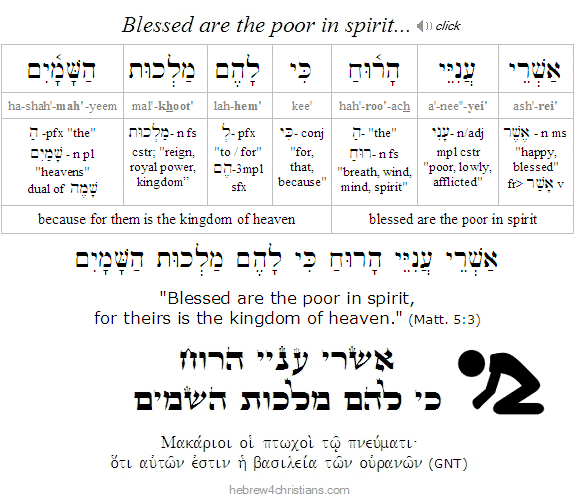 |
The Vision of Faith...

06.04.21 (Sivan 24, 5781) From our Torah this week (Shelach Lekha) we read about the report of the spies: "They (the spies) returned... and brought word and showed them the land's bounty. And they said, "We came to the land to which you sent us. It flows with milk and honey (זבת חלב ודבש), and look, here is its fruit. Nevertheless the people who inhabit the land are powerful; the cities are greatly fortified, and we also saw the (giant) people of Anak there... We are unable to go up against the people there, for they are stronger than we are ... and moreover the land itself consumes its inhabitants" (Num. 13:25-32). The Kotzer rebbe asked, "Did the spies lie? Did they invent words that were untrue? Behold, they spoke as they saw it, so how did they sin?" Yet not everything that is not a lie is truth: you may have all the facts "correct" and yet still speak untruth. Truth is therefore something more than the description of appearances since what appears is interpreted by underlying assumptions that contextualize perception... For example, a future tense proposition (e.g., "it will not rain tomorrow"), or a probabilistic prediction (e.g., "there is a 50% chance it will rain tomorrow), are are based on inferences from what is observed or seen to what is not seen, and therefore they are all grounded in faith that the future will resemble the past, that the laws of nature are constant, that measurement is possible, and so on. Language about possibilities, probabilities, expectations, outcomes, and so on all turn on the question of faith. Our Torah portion this week illustrates the responsibility we have to trust in the promises of God, regardless of our limited interpretation of appearances... When it comes to trusting in an unseen Good, we must believe in order to see, not the other way around.
Surely our great need is to have heart, to find strength, resolution, and steadfast determination to walk boldly during these heartless and depraved days (2 Tim. 3:1-5). We are not without God's help, of course. Yeshua told us that the Ruach HaKodesh (רוּחַ הַקּדֶשׁ) would be "called alongside" (παράκλητος) to comfort us on the journey. The English verb "comfort" literally means "to give strength" (from com- ["with"] and fortis ["strong"]), an idea similarly expressed by the verb "encourage," that is, to "put heart [i.e., 'core'] within the soul." In Hebrew, the word courage is expressed by the phrase ometz lev (אמֶץ לֵב), meaning "strong of heart," denoting an inner quality of the will rather than of the intellect. Our faith is the victory that overcomes the world (1 John 4:4, 5:4).
But what about the trouble, testing, pain, hardship in our lives? How do we deal with these without losing heart? Only God can help us, friend... In this life, where our "outer man perishes" we will experience the "existential pathos" of the life of faith. That is the test. We may feel abandoned by God, or forgotten, or of complete insignificance, or sinful, vile, hopeless confused, and so on, and yet the heart of faith cries out: "Though he slay me, yet will I trust in him" (Job 13:15). Faith is able to see beyond the temporal to the eternal (2 Cor. 4:18) It finds comfort in God's blessing to endure the ambiguities of this world. May the LORD God Israel, Yeshua our Messiah, strengthen us all. Amen.
Hebrew Lesson:
Beholding Promised Good...

06.04.21 (Sivan 24, 5781) How we see is a spiritual decision... From our Torah portion this week (i.e., Shelach Lekha) we read: "See the land, what it is ... whether it be good or bad ... and strengthen yourselves" (Num. 13:18-20). Here note that right seeing even the negative aspects of the land such as the presence of "giants" can only be achieved by the courage derived from faith. When you see things that appear bad, you are to "strengthen yourselves," the Hebrew verb (i.e., וְהִתְחַזַּקְתֶּם) used here means to intently decide to see the good despite the present veil of appearances. When we encounter things that are bad, we must refuse to be overwhelmed by carnal reasoning and fear by looking beyond the moment to behold a promised good (see 2 Cor. 4:18). Whether things appear to be good or bad, trust God is with you, in your midst; he will never leave nor forsake you... The Presence of the LORD is the Hidden Blessing and Treasure in all things...
Hebrew Lesson:
 |
Finding Inner Peace...
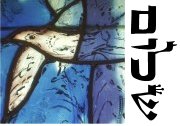
06.04.21 (Sivan 24, 5781) The Hebrew word for peace is shalom (שׁלוֹם), a word that means "wholeness," "completeness," "well-being," and "healing" -- not merely the absence of strife. People often fight with others because they are not made whole within themselves. Just as we cannot really love others until we first learn to love ourselves, so we cannot have peace with others until we first find our own inner healing and peace. Often this means learning to forgive both ourselves and others (including God) so that we can let go of whatever troubles our heart. As we accept ourselves and let go of our fear, we learn to accept others and give up the need to defend ourselves. As Yeshua said, "Blessed (happy) are those who make peace - for they shall be called the children of God" (Matt. 5:9).
Hebrew Lesson:
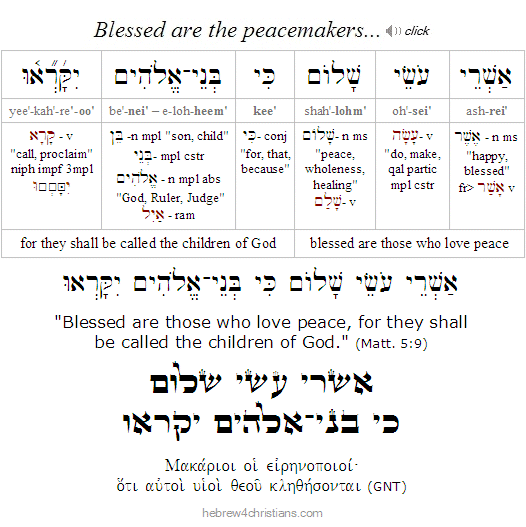 |
In most English translations we read, "Blessed are the peacemakers, for they shall be called the children of God." Note, however, that the Greek word translated as "peacemakers" (i.e., εἰρηνοποιοί) can also mean "those who love peace," that is, those who long for peace and pursue it (see Psalm 34:14). In Jewish ethical teaching, seeking peace is called redifat shalom (רְדִיפַת שָׁלוֹם) and is considered an essential heart quality. Hillel is attributed as saying, "Be of the disciples of Aaron, loving peace and pursuing peace" (Pirke Avot 1:2). Before we can hope to make peace among others, however, we must first know inner peace (שָׁלוֹם פְּנִימִי). If we threaten this peace, we rise up against God, and thereby undermine his will in our lives. Those who love peace will be called the children of God.
Peace is the foundation of God's great work of deliverance in our lives. Yeshua is called Sar Shalom (שַׂר־שָׁלוֹם), the "Prince of Peace" (Isa. 9:6), since salvation brings reconciliation (i.e., peace) between God and man (Rom. 5:1) and sets us free from the fear of condemnation. When we walk in the peace of God (שְׁלוֹם הָאֱלהִים) that "surpasses all our understanding," we are empowered to be a blessing to others in your life. "The fruit of righteousness is sown in peace by those who make peace" (James 3:18).
We understand the Torah commandment, "Thou shalt not steal" (לא תִּגְנב) to imply more than being forbidden to steal from others, but also to include the prohibition against stealing from ourselves by failing to practice inner honesty. When we lie to ourselves, we "steal" from the truth, we rationalize what is unjust, and we thereby rob from ourselves the great blessing of inner peace. Indeed, the traditional sages say that every sin essentially constitutes theft from God. For instance, in his discussion of teshuvah (repentance), Maimonides notes that confession of sin is connected with theft (Num. 5:7). Rabbi Yitzchak of Gur asks, "Inasmuch as there are 365 prohibitions in Torah, why does Torah choose to specify the need to confess sin in regard to theft?" He goes on to answer by explaining that if someone borrows something for a specific use, he is not permitted to use it for any other purpose other than that specified, lest he abuse the privilege and "steal the use" of the item. Likewise, God lends the soul the ability to speak, hear, see, and so on, for the sake of living a godly life. If we abuse these things, for example, by using our lips and tongue to speak evil about another, we are using our faculties for a purpose other than God intended, and that constitutes theft. Therefore every sin is a form of theft, an act of "breaking faith with the LORD," and that is why Torah mentions confession of sin in connection with it.
Hebrew Lesson:
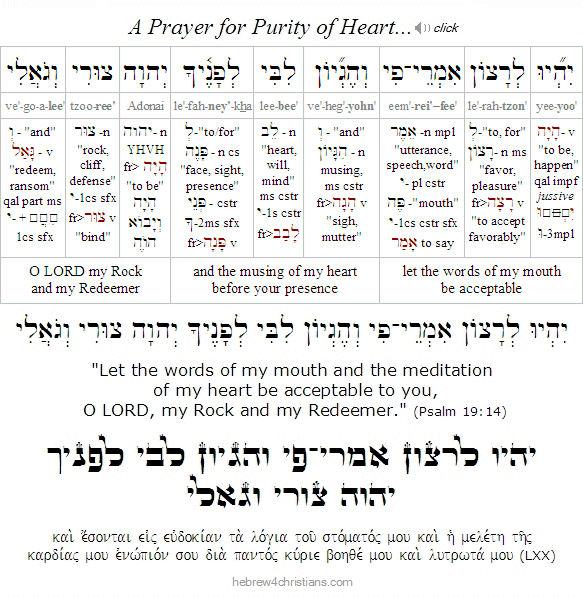 |
Healing of your Self...

06.03.21 (Sivan 23, 5781) "Wherever you go, there you are..." You can't escape from yourself; you can't run away from who you are, and therefore your relationship with yourself is as inescapably eternal as your relationship with God. Indeed how you relate to yourself expresses your relationship with God (Luke 15:17). If you are self-abusive, if your life is a "living hell," you must first of all face yourself and quit denying the condition of your heart. The LORD delivers through the wound; he does not offer you "Nirvana" to extinguish who you really are... If you have a critical spirit, if you cast eyes of suspicion upon others, then understand this reveals your own self-rejection and leads to the hell of never accepting yourself... Perhaps you learned to reject yourself through your earliest experiences, or from your family's secret pain, but regardless you must be delivered from the fear of who you are, and only God in his mercy can heal you from that wound... Only when you are rightly related to God in the truth are you able to become a healed self; only by God's power can you come alive from the dead to know the truth of God's redeeming love.
Hebrew Lesson:
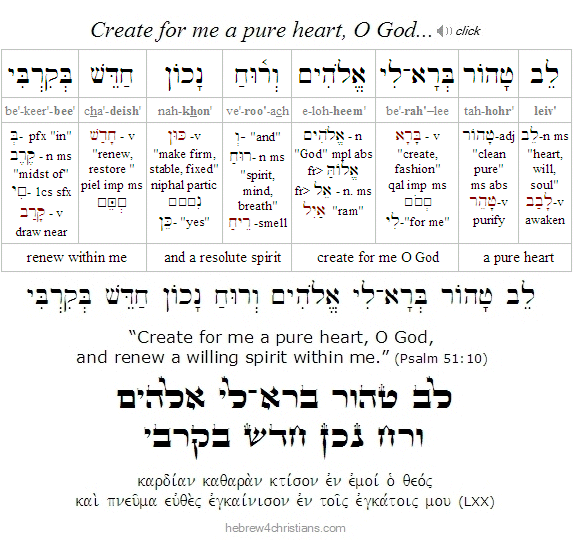 |
Seeing with Heart...
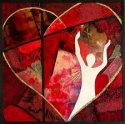
[ The following concerns this week's Torah reading, parashat Shelach Lekha. Please read the Torah portion to "find your place" here. ]
06.03.21 (Sivan 23, 5781) "We walk by faith, not by sight" (2 Cor. 5:7). This is true for all people, since every soul lives by faith of some kind or another. Our Torah portion this week (Shelach) begins with the episode of the spies and concludes with the warning not to "spy after your heart and after your eyes" (Num. 15:39). The Torah mentions the heart first and then the eyes to indicate that the eyes follow the heart. We see as we believe with our heart: "According to your faith be it done unto you." When the spies said, "We are not able to go up (לא נוּכל לעלות)... for they are stronger than us" (Num. 13:31), they revealed their unwillingness to believe in God's promise, or, to put it another way, they revealed their faith in God's inability to deliver on his word.... Indeed, the Hebrew word for "than us" (i.e, ממנו) can also mean "than Him," suggesting that the spies believed that even God would be unable to uproot the Canaanites! According to their faith, so it was done; by believing that it was impossible, they lost the possibility of God's promise...
Faith sees what is possible and refuses to yield to the artificiality of mere appearance. Indeed, appearances are often a test of our courage. We may never know how often a test was given and - just before victory was manifest - the heart grew faint and was lost to fear. "According to your faith" (על פי אמונתך) is a spiritual principle that applies to everyone. In that sense, it is not that we have faith that matters (since we all do), but whether our faith is grounded in the promises and power of the LORD God of Israel, or something else....
Hebrew Lesson:
 |
The Blessing of Affliction...
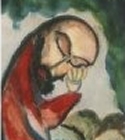
06.03.21 (Sivan 23, 5781) "My eye grows dim through sorrow; every day I call upon you, O LORD; I spread out my hands to you... Help me, O LORD my God; save me according to your love" (Psalm 88:9; 109:26). Such words pierce through the clichιs and chatter about religion, theology, and so on, voicing the lament of a soul in trouble, desperately crying out to God for help... The language of prayer is often quickened by affliction and trouble, for the heart senses it must find God or die. "The troubles of my heart are enlarged..." (Psalm 25:17). "Heal me, O LORD, and I will be healed..." for if you will not help, O Lord, then I will perish; I will be consumed in my grief, I will waste away in the void of darkness... "Why is my pain unceasing, my wound incurable, refusing to be healed? Will you be to me like a deceitful brook, like waters that fail?" (Jer. 15:18). O Lord, "I am poor and needy; my heart is pierced within me" (Psalm 109:22). During hours of pain or mental anguish prayer becomes spontaneous, raw, unscripted and devoid of empty words. Anguish moves us right to the point, bypassing other concerns, distilling the heart's cry for God's help. If you feel overwhelmed, pour out your heart in prayer... It is not the words of the prayer that matter as much as it is the fervor, the intensity of the heart, and the passion that yields itself before God. "Blessed are they that mourn, for they shall be comforted" (Matt. 5:4). "The LORD is near to the broken of heart and saves the crushed in spirit" (Psalm 34:18).
קרוב יהוה לנשׁברי־לב
ואת־דכאי־רוח יושׁיע

"The LORD is near to the broken of heart
and saves the crushed in spirit."
(Psalm 34:18)
Fearing No Evil...

06.02.21 (Sivan 22, 5781) The emotion of fear profoundly affects the way the brain processes images and messages. Fear colors the way we see and hear things. And since the mind and body are intricately interconnected, fear is the root cause of many physiological problems such as heart disease, high blood pressure, clinical depression, and other ailments. Indeed, left unchecked, fear can be deadly...
Most of our negative emotions come from fearful thoughts, including anger, frustration, and rage. On a spiritual level, fear and worry can cause people to question God's love, to doubt His promises, and so on. The devil knows that frightening people causes them to be unsettled, off-balance, and therefore vulnerable to all sorts of sickness, manipulation, and deception. Living in fear is a form of slavery (Heb. 2:15).
Logicians call illegitimate appeals to fear argumentum ad baculum, or the "appeal to the stick." When someone plays on your fears, it is wise to discern whether there is any basis in reality for the supposed threat, or if the appeal is simply a rhetorical scare tactic intended to persuade (coerce) you to accept some sort of conclusion. Unscrupulous people (such as advertisers, political groups and dictators) regularly use fear to manipulate public opinion, of course, and they are only too glad to tell you exactly what you should fear. They are delighted to prey upon your anxieties and then offer you their supposed "remedy."
The war for truth began in the Garden of Eden, when Satan lied to Eve by saying that she wouldn't die if she disobeyed God (Gen. 3:4). Satan cunningly played on Eve's fear of being deceived to persuade her to disobey. Fear, then, is the emotional center of sin and the opposite of faith. The fearful are referred to as the "unbelieving" and those who "love and make a lie" (Rev. 21:8, 22:15).
God repeatedly tells us not to be afraid not of man, nor of war, nor of tribulation, nor of various plagues, yea, nor even of death itself (Rom. 8:35-39). Indeed, one of the most frequently occuring commandments in Scripture is simply al-tirah, "Be not afraid."
But how do we overcome our fear? Simply by wholeheartedly trusting that God is with us... The LORD will never leave nor forsake us, even if we are faced with difficult circumstances. The antidote to fear is heartfelt faith in God's love (1 John 4:18). God saves us from our fears (Psalm 34:4, 2 Tim. 1:7). When we trust that God personally cares for us, we find comfort and courage to face life without fear.
Hebrew Lesson:
 |
Comfort from the Shepherd...

06.02.21 (Sivan 22, 5781) The Spirit of the Lord comforts and reassures those who trust in Him: "My sheep hear my voice, and I know them, and they follow me. And I give them eternal life (חַיֵּי עוֹלָם), and they will never perish - no, never! - and no one will snatch them out of my hand" (John 10:27-28). Note that the Greek grammar in this verse uses a "double negation," which is the strongest way to deny something. In other words, if the question were asked, "Will one of these sheep perish?" the answer is emphatic: "No, no, it will never happen! It is unthinkable!" Indeed all those who belong to Messiah "shall never, ever perish - not into eternity (εἰς τὸν αἰῶνα)." It is an eternal certainty that you who are trusting in Yeshua will never perish, and no power in heaven or earth will be able to take you out of God's hand... "Surely goodness and mercy shall pursue you all the days of your life, and you shall dwell in the Presence of the Lord forever (Psalm 23:6).
Regarding the certainty of salvation Yeshua said: "I tell you the solemn truth, the one who hears my message and believes in the One who sent me has (i.e., ἔχει, present active indicative) eternal life and will not be condemned, but has passed over (i.e., μετά + βαίνω, lit., "crossed over" [עָבַר]) from death to life" (John 5:24). Note that the verb translated "has passed over" (μεταβέβηκεν) is a perfect active that expresses completed action: "this one has already passed over from death to life." In other words, it is an accomplished spiritual reality though it is only experienced as we surrender to the love and grace of God. As the apostle Paul later summarized: "For it is by grace you have been saved (i.e., σεσῳσμένοι, a perfect passive participle that denotes completed action done on your behalf with effects that continue to the present) through faith, and this not from yourselves, it is the gift of God, not a result of works, so that no one may boast" (Eph. 2:9-10). Ultimately, salvation is a question about who you really are, not about what you do....
God does not want us uncertain or unsure of His great love for us. A fearful believer explained that he was anxious about his acceptance before heaven. When he was asked to define "salvation," he answered, "freedom, deliverance, rest, peace." So you think fear will help you do away with your fear? You are fearful of the idea of freedom from fear?
"Be strong and of good courage" - chazak ve'ematz (חֲזַק וֶאֱמָץ). The LORD God promises "never to leave you nor forsake you," and to be with you wherever you go (Josh. 1:5,9; Heb. 13:15, Psalm 139; Matt. 28:20). In the Greek New Testament the wording of Hebrews 13:15 is highly emphatic: "Not ever will I give up on you (οὐ μή σε ἀνῶ); no, not ever will I leave you behind (οὐδ᾽ οὐ μή σε ἐγκαταλίπω)." May you hear the voice of the Good Shepherd calling you, and may He forever keep you under His watchful care. Amen.
Hebrew Lesson:
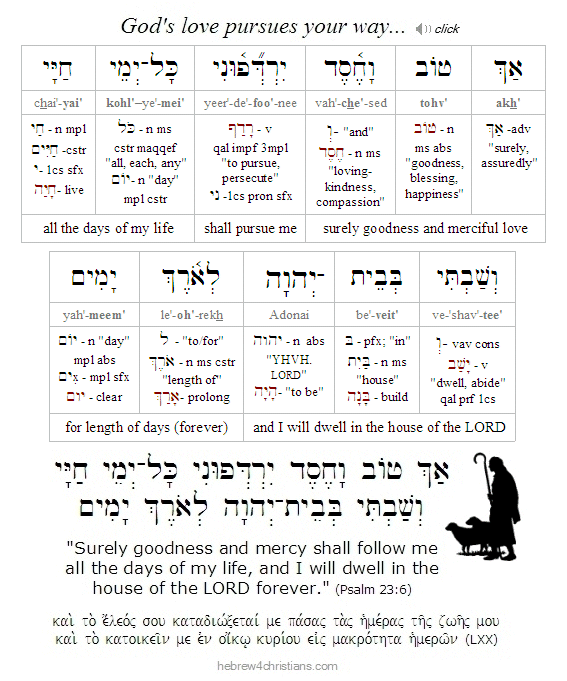 |
Hope, despite ourselves...

06.02.21 (Sivan 22, 5781) Life isn't easy, and even believers can get angry at God at times. For example, we may feel disappointed and even resentful when bad things happen to us or to those whom we love, especially if we had prayed for God's intervention and help regarding the matter. Seemingly unanswered prayer can make us feel lonely and afraid about what is happening to us. We may begin to second-guess our faith or wonder if God really listens to us. We must be careful and ask God for solace and wisdom lest we turn numb inside..
Many of us are unhappy and feel empty throughout the passing of our days. Many waver in their faith, on the one hand affirming that they believe that God is faithful and good, while on the other hand wondering why God apparently left then when they needed him most. They reason that if God was not there for them in their most vulnerable moments, can he be trusted to be there for them in future times of trouble?
Some of us can talk a good talk about God and spirituality, but we fail to seriously practice the presence of God, we "forget" that the Lord is real, a "very present help in trouble," and therefore we "collapse back" into the murmur of godless thinking... Ironically enough, many of us are proud and yet hypocritical people. We tend to avoid certain obvious sins but secretly harbor hidden ones like envy, spite, fear, anger, selfishness, lust, gluttony, greed, and a general lack of charity. In short, we don't live up to our ideals or principles, and in our "fallenness" we discover -- if we are honest -- our great need for deliverance from ourselves. It is then that we discover that God has not abandoned us, but on the contrary, we have abandoned Him by turning to anger, hopelessness, despair, and bitterness. Honesty, however, is essential to healing, as Kierkegaard once said: "No person is saved except by grace; but there is one sin that makes grace impossible, and that is dishonesty; and there is one thing God must forever and unconditionally require, and that is honesty."
We must give our secret pain to God, even if we don't understand it, and even if it refuses to go away... Our hearts are often vexed; we are a mess of mixed motives; we are strong to be made weak, weak to be made strong. We bless and curse from the same mouth... And yet, despite all this, despite our inner contradictions, the dance between the "old man" and "new," the divided house of our lives - our present sorrows, our troubles, our fears we must endure ourselves, we must press on, and we must never let go of hope in God's love. Therefore we must not hide ourselves from God's presence, nor pretend to be what we are not. We are invited to come boldly before the Lord to help in our hour of need (Heb. 4:16). O Lord my God, be Thou my healer, the One who makes me whole... "Heal me, O LORD, and I shall be healed."
Hebrew Lesson:
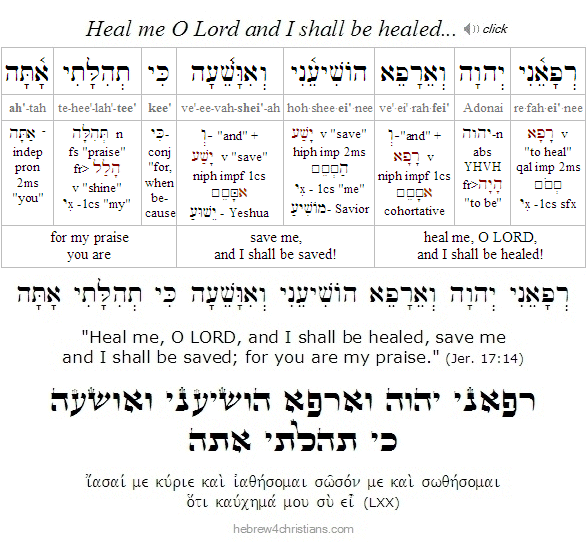 |
Yeshua said that God knows the number of the hairs on your head (Matt. 10:30), which means that he knows you better than you know yourself... Your heavenly Father "sees in secret," and that also means that he can and will save you from whatever is hidden within you that still resists his love and touch... We have to trust in God's power to heal us, even when it seems that healing is not forthcoming, even when we still find ourselves divided, troubled, and anxious. We have to believe that God's help is always present for us (Psalm 46:1).
God sees what He does within us, His "it-is-finished" work, the effect of His great salvation within our hearts, even if at this present hour this may be hidden from our eyes... There is appearance, and there is reality; and only God sees what is ultimately real. We have to trust in His promise to be transformed into the divine nature, even if today we find ourselves sinful, needy, and in disrepair... כּל־יְמֵי צְבָאִי אֲיַחֵל עַד־בּוֹא חֲלִיפָתִי - "All the days of my struggle I will keep hope until my change comes" (Job 14:14). So don't give up, friends. We are saved by hope (ἐλπίδι ἐσώθημεν, Rom. 8:24), a hope for you today. Believe to see!
Hebrew Lesson:
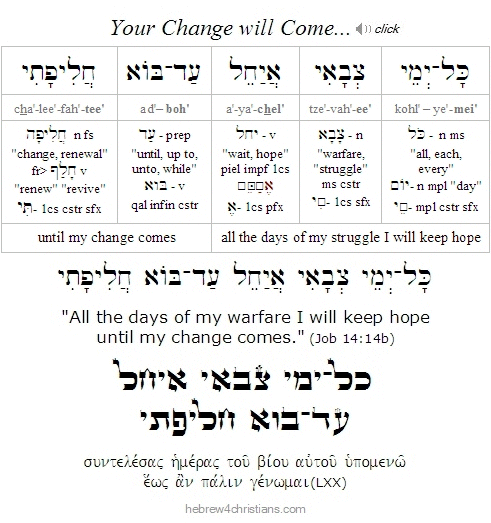 |
Draw Near to Love...

06.01.21 (Sivan 21, 5781) It is written in our Scriptures: "You shall be wholehearted with the LORD your God" (Deut. 18:13). We approach God for what? for personal blessing? for our needs to be met? And yet our greatest need is for communion with God, that is, for a real connection that is full of eternal significance. We cannot draw near to God with an insincere heart, however, since that implies distance between God and ourselves. Neither can we draw near and seek to defend ourselves, for it is God alone who justifies... Relating to God halfheartedly creates anxiety and inner contradiction within us, revealing that we have not yet made up our minds to be entirely "with the LORD." A divided heart both wants God and does not want God at the same time. It is a state of being "two-souled" (δίψυχος) and therefore unstable in our way (James 1:8). To be made whole (i.e., tamim: תָּמִים) with God means surrendering your will to God's love, letting go of your hesitation, and becoming "filled with all the fullness of God" (Eph. 3:19). Therefore when God asks you to be wholehearted with Him, understand this to mean that his desire is for you to draw near, to be made whole, and to be filled with passionate assurance of his love for you. Amen.
Hebrew Lesson:
Confession and Reality...

06.01.21 (Sivan 21, 5781) Sin is not the result of not knowing what is right, but rather is the condition of being unwilling to accept moral truth, and therefore is the refusal to do what is right. It is not the result of ignorance but rebellion. Sin doesn't say "I can't" but rather "I won't," and therefore it is a matter of the will, the heart, the secret desires of the soul... Just as grace is inaccessible for someone who refuses to be honest with himself, so is forgiveness. If a person refuses to confess the truth about his condition, salvation itself is impossible, since God literally cannot save the soul that denies its need for Him. Therefore the Scripture does not vainly declare: "Whoever conceals his transgressions will not prosper, but the one who confesses and forsakes them will find mercy" (Prov. 28:13).
Hebrew Lesson:
A person who "conceals" or "covers" his sin denies it, either by outright disavowal or by explaining it away by offering self-deceptive excuses. This person simply cannot prosper in the spiritual sense of the word because he is not living in reality... Indeed, his conscience is burdened with a "secret ban," an inner voice of condemnation that must be suppressed and squelched. It is only the person who comes to the light, who acknowledges the truth of his sin and who is anxious to be free of its effects, who will be shown mercy (i.e., rachamim (רַחֲמִים), which comes from the word rechem (רֶחֶם), "womb").
Note that God alone has the prerogative to cover or atone for sin, as an expression of His grace, but it is never fitting for someone to atone for his own sin in order to exonerate himself. God's anger over sin is not appeased when sin is minimized, dismissed, excused, or rationalized away (though the LORD delights when we overlook the offenses of others). This is because all sin is an offense against God and represents a breach of the relationship between the sinner and God. Your sin, in other words, hurts not only yourself and other people, but most significantly, it wounds the very heart of God Himself by causing a breach or separation in your relationship with Him. Therefore we see Yeshua forgiving others for sins they have committed against other people as if He were the offended party in the sin. As C.S. Lewis once wrote, "He told people that their sins were forgiven, and never waited to consult all the other people whom their sins had undoubtedly injured. He unhesitatingly behaved as if He was the party chiefly concerned, the person chiefly offended in all offenses. This makes sense only if He really was the God whose laws are broken and whose love is wounded in every sin" (Mere Christianity, 1952).
In this evil world, it may sometimes seem that crime "pays," but certainly not before the Divine Presence, and in the world to come, every word and deed will be fully accounted before the bar of God's justice and truth. But even in this world, the sinner is secretly haunted by his conscience; he is driven to madness, hidden despair, and lives in dread and anxiety over the truth he conceals... It has been said that the problem with "getting away with it" is that you indeed "get away with it," meaning that your sin will follow you as doggedly as your own shadow in this world... Ultimately sin is a form of cowardice, since it hides in fear from the light of truth. Unconfessed sin leads to anxiety, paranoia, and weakness of the soul...
"What is done through lies can assume the mask of truth; what is accomplished through violence can go in the guise of justice, and for a while the hoax may be successful. But soon people realize that lies are lies at bottom, that violence is violence - and both are damned." (Martin Buber)
I mentioned recently that one of the reasons God revealed the Ten Commandments was because it was His way of saying, "I know who you really are, I see you..." This is why the people drew back in terror, because they realized that God saw the inner condition of their heart, exposed it, and shined the light of moral truth upon it. Nonetheless it is a great and ongoing credit to the Jewish people that they were willing to receive the revelation at Sinai, since it demonstrates that they were genuinely willing to be honest with themselves. Despite their many subsequent failures, they still revered the truth of God's Torah and meticulously preserved the revelation for future generations (Rom. 3:1-2).
The Path of Life (ארח חיים)

06.01.21 (Sivan 21, 5781) Spiritual regeneration or transformation isn't just leaving the sinful past behind you, but discovering the glory of true and infinite life that sustains all of reality... There is change of perspective, of no longer backing away from the hell you came out of by turning around to focus on heaven, your true spiritual home. We are called to pursue the goal of the upward call of God in Messiah (Phil. 3:14). If we walk in the light, the LORD will cause us to know "orach chayim" (ארח חיים), the path of life; we will find joy in the Divine Presence; and we will discover pleasures that endure forever:
Hebrew Lesson:
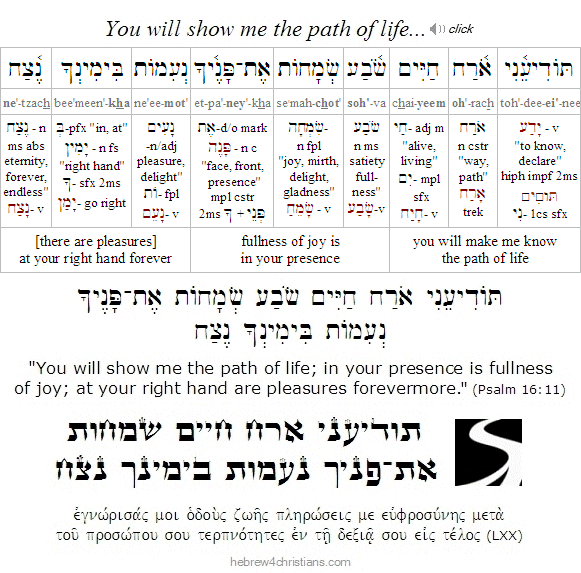 |
Have you discovered the glory and peace of God's love, despite the many sins and the shame of your life? Do you know "in your gut" that his love means no longer having to defend or explain yourself? God's love enables you to quit hiding what you really are from Him; you can give up the pretense of being something you're not. When you turn to the Lord in the transparency of your brokenness, weakness, and neediness, you will find Him there, accepting you for who you really are... The path of life is Yeshua; he is the Bridge and Glory to all that is beautiful and true!
<< Return
|


















